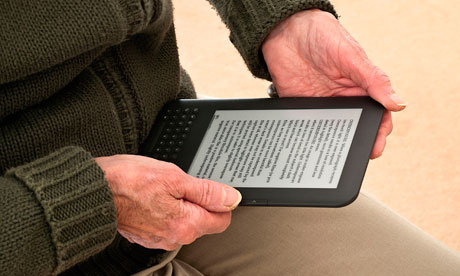
New technology, like pop music or radical politics, is something you're expected to lose touch with as you get older. This idea is encouraged by the young, who would rather their elders gracefully embraced luddism than try to befriend them on Facebook. What's refreshing about e-reading is that it's not just popular with traditional early adopters; their parents are getting in on the act too.
According to market researcher Bowker, while younger people's ebook consumption is plateauing, in older age groups it continues to grow: more than a quarter of 45- to 55-year-olds and a fifth of over-55s bought an ebook in the six months to March 2012, up from 17% and 15% last November. A OnePoll survey last year found the over-55s were more likely to own an e-reader than 18- to 24-year-olds.
We shouldn't be too surprised: older people tend to be heavier book-buyers and baby-boomers keen technophiles. But e-readers have qualities that could make them indispensable to an ageing population.
An obvious plus is the option to adjust text size and contrast. Until recently, people with dodgy eyesight had to make do with large-print books, which are hard to get hold of, have a woeful range of titles and – worst of all – don't do much for one's street cred. Now, not only can you read filthy books without anyone noticing, you can read filthy books in an 18-point font.
For the elderly, e-readers have even greater potential. They are light, which is handy for arthritis sufferers, especially those with poor vision (large-print hardbacks weigh a ton). Devices with 3G are perfect for people who find it hard to get about, letting you download new books – and thousands of free classics – from the comfort of your armchair.
Perhaps the government could issue pensioners with a Kindle instead of a free TV licence? Not only would this add up to a saving of £56.50 per person, it might end up bailing out our sickly publishing industry. Older readers have a distinct advantage over younger ones: they are more willing to pay for what they read.

